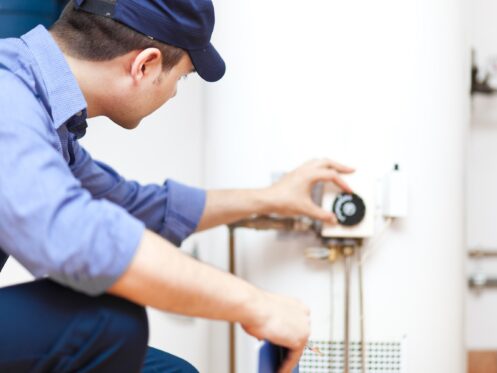Your water heater works behind the scenes daily, ensuring you have hot water for showers, dishes, and laundry. But like any hardworking appliance, it needs a little attention to keep running smoothly. If you don’t do maintenance, your system could break down when you least expect it, your energy bills could go up, or the whole thing could stop working.
Regular checkups can help you avoid these headaches and keep your water heater reliable and efficient. That’s why All Klear in Springfield, MO, is here to help with expert maintenance and other water heater services so you never have to worry about running out of hot water.
Checking for Leaks Before They Become a Problem
Leaks often start as small drips near the tank’s base or around the connections, but they can worsen. If you see water pooling around the heater or damp spots nearby, something’s wrong. Water heaters have a pressure relief valve designed to release extra pressure when needed, but if it’s constantly dripping, that could indicate a bigger issue. A worn-out valve, a loose connection, or even corrosion inside the tank could be causing the problem.
A good habit is to visually inspect your water heater regularly. Run your hands along the pipes and connections to feel for moisture. If you find a leak, don’t wait to get it checked. Fixing a minor issue now is much easier (and cheaper) than dealing with a flooded utility room later.
Flushing Out Sediment for Better Performance
If you’ve ever noticed your hot water taking longer to heat up or heard strange popping noises from your tank, it could be due to sediment buildup. Minerals from the water supply settle at the bottom of the tank, eventually creating a thick layer that acts like insulation. This makes your water heater work harder, using more energy to do its job.
Flushing the tank helps remove this buildup and keeps your system running efficiently. Without regular flushing, sediment can harden, making it nearly impossible to remove without professional help. In extreme cases, this buildup can cause overheating and shorten the unit’s lifespan.
The easiest way to tell if your tank needs flushing is to check the quality of your hot water. If it looks murky, has a rusty tint, or carries a slight metallic smell, it signals that sediment is circulating through your plumbing. Keeping your tank clean improves efficiency, helps your water heater last longer, and keeps your water fresh.
Adjusting the Temperature for Efficiency and Safety
Your water heater’s thermostat plays a huge role in balancing comfort, energy savings, and safety. Many units are set too high by default, sometimes reaching temperatures that increase the risk of scalding while also wasting energy. You can save money without giving up ease by lowering the temperature to an acceptable level.
A good target is around 120°F, hot enough for daily use but not so high that it drives up energy costs. If you’re constantly running out of hot water, turning up the heat isn’t always the best solution. The problem could be something else, like sediment buildup, a faulty heating element, or a small unit for your household’s needs.
Another reason to check your water heater’s temperature is safety. Water that’s too hot can cause burns in seconds, especially for children or elderly family members. Keeping it at a reasonable setting ensures everyone in the home stays safe while helping you save a few extra dollars on your monthly utility bill.
Checking the Anode Rod to Prevent Rust
One of the most overlooked parts of a water heater is the anode rod, but this small piece of metal plays a big role in keeping your tank from rusting. Corrosive substances in the water are drawn to the rod, which stops them from damaging the inside of the tank. Eventually, though, the rod wears down and needs to be replaced.
If the anode rod is completely used up, your tank is left unprotected, and rust starts forming inside. Once rust takes hold, there’s no stopping it. The only option is to replace the entire unit. Checking the anode rod every couple of years can help extend the life of your water heater and prevent major issues.
Signs that the anode rod is wearing out include rusty water, a rotten egg smell in your hot water, or visible corrosion around the tank. If you notice any of these, it’s time to have the rod inspected and replaced if necessary. This small step can add years to your water heater’s lifespan and keep your hot water clean and odor-free.
Keeping an Eye on Water Pressure
Water pressure is another factor that can affect the performance and longevity of your water heater. If the pressure is too high, it puts extra strain on the tank and pipes, increasing the risk of leaks or even tank failure. Many water heaters are made to work with pressures between 40 and 60 psi. Anything higher than that can cause problems.
One of the easiest ways to check your water pressure is with a simple gauge that attaches to a faucet. If the pressure is too high, a pressure-reducing valve can be installed to bring it back to a safer level. Keeping the pressure in check helps reduce wear and tear on your water heater and entire plumbing system.
Inconsistent water pressure can also signal a developing problem. If you notice sudden pressure drops when using hot water, it could indicate sediment buildup, a partially blocked pipe, or a failing heating element. Attention to these small changes can help you catch potential problems early and keep your system running smoothly.
Knowing When It’s Time for Professional Maintenance
You can handle simple tasks like adjusting the thermostat or watching for leaks, but a professional tune-up goes much deeper to keep your water heater running smoothly. A trained tech will flush the tank to remove sediment buildup, which can cause your system to overheat and reduce efficiency.
They’ll also check the anode rod, a metal component inside the tank that prevents rust from eating away at the lining. If this rod is too corroded, your tank could start rusting from the inside out, leading to leaks or a complete system failure. The technician will also inspect the pressure relief valve, heating elements, and gas or electrical connections to ensure everything works safely and efficiently.
Regular plumbing maintenance for your water heater helps prevent surprise breakdowns and keeps your system from working harder than it should. When sediment isn’t flushed out or key components start wearing down, your water heater has to use more energy to keep up, causing higher utility bills and faster wear and tear. Scheduling routine service extends the lifespan of your unit, keeps energy costs under control, and helps you avoid expensive emergency repairs.
Suppose your water heater makes unusual noises like popping or rumbling, producing discolored water, or struggling to keep up with your household’s hot water needs. In that case, it’s time to call a professional. Catching minor issues early—like a failing thermostat, a damaged heating element, or a minor leak—can prevent significant problems, saving you time, money, and frustration.
Whether it’s flushing out sediment, replacing a worn-out anode rod, or adjusting water pressure, regular maintenance is the single best way to extend your system’s life and keep it running efficiently for years to come.
Call Us For Maintenance Today
A little maintenance now can save you from significant problems later. Taking care of your water heater—flushing the tank, inspecting for leaks, or ensuring it runs efficiently—pays off in the long run. And while tankless water heaters require less maintenance, some of the same rules apply. Leave it to the pros and contact All Klear today to schedule a maintenance visit.




